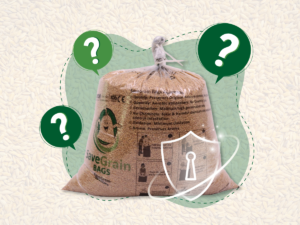Every year farmers face tremendous post-harvest losses that result in the loss of grain and livelihood of the agricultural industry. One of the leading causes of post-harvest losses is pest infestation. Farmers sell the contaminated grain at lower prices as the damaged grains lack nutrition as well as taste. Rice Weevils are the most notorious insects that cause damage to the grains.
Rice weevils can wreak havoc on a variety of crops when they’re being stored. Pesticides are currently used to kill rice weevils, however, these approaches damage the grains in the process. Hermetically sealed bags, on the other hand, have been demonstrated to be particularly successful in eliminating these insects and decreasing post-harvest losses. Hermetic bags are efficient because they keep oxygen out, depriving insects of their metabolic energy and water supply. Therefore rice weevils cannot survive in the hermetic bags.
The Journal of Stored Products Research demonstrates how hermetic storage has helped reduce post-harvest losses in various countries in Africa. The pest infestation in hermetic storage was minimal when compared to other traditional storage methods. Aerial storage, drying floors, or storage in cans, bins, or jars, as well as plastic or jute bags, are all traditional storage options. Traditional methods do not protect against damage due to rain and humidity. Hermetic bags, on the other hand, rely on airtight technology. As a result, they keep moisture out and regulate the temperature.
Pest infestation is frequent in traditional storage systems. Pest infestation does not occur in hermetic bags, on the other hand. The air-tight technology causes an oxygen deficiency. Pests are unable to survive as a result. The grains are fully dry and free of moisture.
Silo storage systems, which have been widely utilized in the agriculture business for decades, are popular for their bulk storage capacities among the different types of grain storage systems. However, there are numerous disadvantages of this type of storage. Controlling the temperature and moisture of silos is critical for preventing grain contamination, but this can be difficult. Poorly controlled temperature and moisture can worsen insect infestation, mold, and grain sprouting.
Farmers use a variety of pesticides to protect grain from pests and insects during storage. These insecticides, on the other hand, are frequently harmful to both humans and animals. Hermetic Bags provide a toxic-free alternative. The respiration of grains, insects, and molds in the storage will raise CO2 levels because the hermetic bags are airtight. We can inhibit fungal and insect growth in such settings without the use of insecticides. Because we are all too aware of the dangers of pesticides, Hermetic Bags are an excellent option. They keep grain quality while being non-toxic.
The long-term solution to eliminating post-harvest losses due to pest infestation is Hermetic Bags. Save Grain Bag offers hermetic storage bags to protect agricultural produce from climate changes and contamination by pests, hence preserving the grain in its optimal form. Save Grain Bags come in various sizes up to 50kg bags that can be used to store and preserve grain for both domestic as well as commercial purposes.
Hermetic Bags are the best way to deal with rice weevils and other insect infestations. Save Grain Bags’ hermetic bags are an excellent alternative to traditional ways. The advantages of hermetic bags outweigh the traditional grain storage methods. They are also an efficient alternative for decreasing grain storage losses in India for the same reason.





